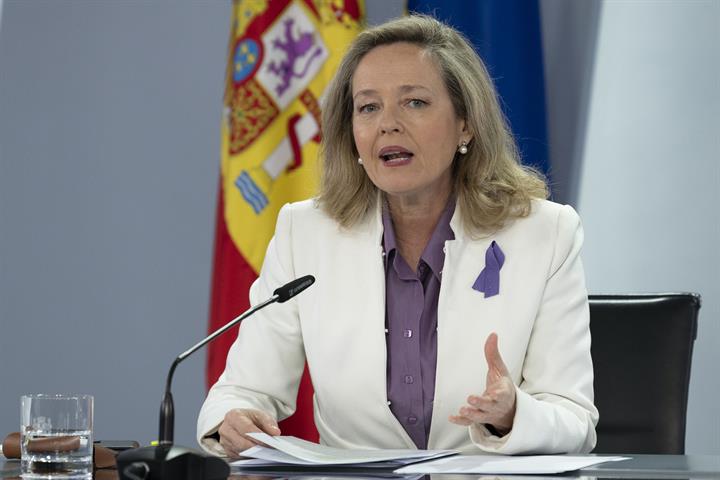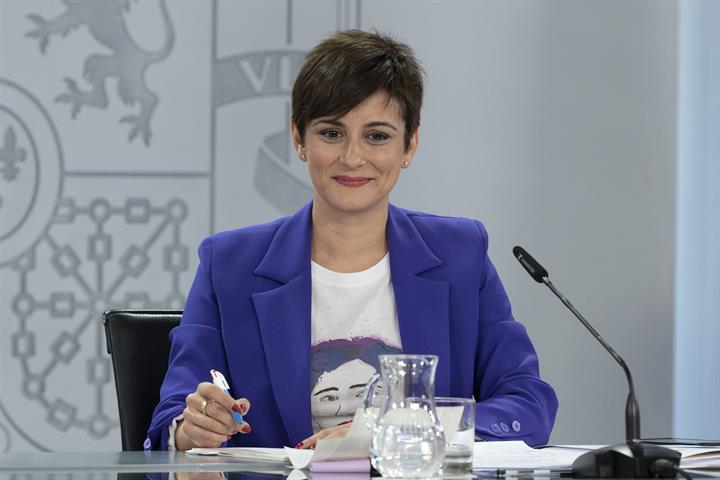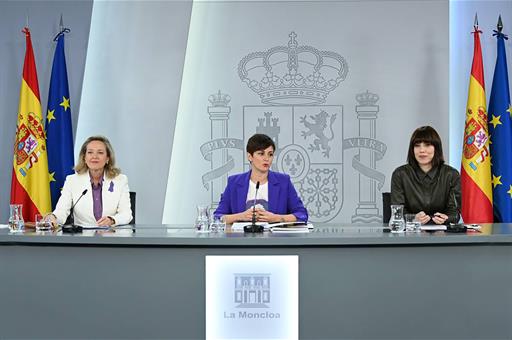Council of Ministers
The Government of Spain promotes parity of representation in politics, government and business
Council of Ministers - 2023.3.7
Moncloa Palace, Madrid
The Council of Ministers has analysed the Preliminary Draft of the Organic Law on Parity of Representation in Decision-Making Bodies, which will guarantee effective equality in politics, administration and business.
The Minister for Territorial Policy and Government Spokesperson, Isabel Rodríguez, stated that the so-called parity law means that society must be represented everywhere, especially in places where economic and political decisions are made.
In a similar vein, the First Vice-President and Minister for the Economy and Digital Transformation, Nadia Calviño, stressed that the regulation "guarantees the participation of women in decision-making bodies, breaks the glass ceiling in the public and private spheres, and consolidates Spain as one of the most progressive countries worldwide in terms of gender equality".
Calviño explained that the future law responds to an EU directive on the matter and establishes the objective of 40% female participation in public and private management bodies.
Listed companies must ensure that their boards of directors have at least 40% female directors by 1 July 2024. In senior management positions, they will need to adjust selection processes to meet this objective. The first vice-president recalled that the presence of women on the boards of these types of companies currently stands at 30%, and is below 20% in senior management positions.
The new regulation will also apply to large unlisted companies, i.e., those with more than 250 employees or an annual turnover of more than €50 million. These companies will have an additional period until July 2026 to comply with the standard.
The principle of balanced representation must also be complied with in the governing boards of professional bodies and in court, as well as on juries for awards or public recognitions.
Nadia Calviño explained that at the political level, the composition of electoral candidacies will have to comply with gender quotas by means of a zipper system (candidacies made up of people of both sexes in alternating order). The government will also have to be governed on the basis of gender quotas, and no gender will have a presence of less than 40% in the Council of Ministers.
Measures facilitating gender equality
 The First Vice-President of the Government of Spain and Minister for the Economy and Digital Transformation, Nadia Calviño, during her speech at the press conference after the Council of Ministers | Pool Moncloa/Borja Puig de la Bellacasa
The First Vice-President of the Government of Spain and Minister for the Economy and Digital Transformation, Nadia Calviño, during her speech at the press conference after the Council of Ministers | Pool Moncloa/Borja Puig de la Bellacasa
The vice-president argued that gender equality has been one of the vectors guiding the government's action since 2018 for reasons of social justice and economic rationality, because "we have to take advantage of 100% of female talent to improve the productivity of companies and achieve stronger and more sustainable growth over time".
Calviño stressed that the labour reform has facilitated the reduction of temporary employment and boosted the creation of stable, quality employment among women. Permanent contracts for women have increased from 9% to 41% of the total. Similarly, measures taken to ensure equal pay have reduced the pay gap to below 19%. Equal paternity and maternity leave is also changing the dynamics of young families and leading to real equality in recruitment.
The Minimum Basic Income also provides special protection for female-headed households, which account for more than 99% of single-parent beneficiary families. The increase in the minimum wage benefits two million people, mostly young people and women.
Nadia Calviño added that the gender gap in the activity rate has been reduced, especially in the field of science, technology and digitalisation, where Spain is ahead of neighbouring countries. The gap in Internet use has likewise narrowed.
Institutional Statement on International Women's Day
On the occasion of tomorrow's International Women's Day, the government has adopted an institutional declaration in which it demonstrates its firm commitment to a feminist country, to the promotion and protection of the rights of women and girls, and to real and effective equality between women and men.
The government spokesperson stressed that much progress has been made in the socio-economic sphere during this legislature, with legislation passed that has had a positive impact expressly for women, while acknowledging that the challenge that remains is to put an end to gender-based violence.
Statute of the Spanish Space Agency
 The Minister for Science and Innovation, Diana Morant, during her speech at the press conference after the Council of Ministers | Pool Moncloa/Borja Puig de la Bellacasa
The Minister for Science and Innovation, Diana Morant, during her speech at the press conference after the Council of Ministers | Pool Moncloa/Borja Puig de la Bellacasa
The Council of Ministers has approved the Statute of the Spanish Space Agency, which will coordinate Spain's strategic action in the field of space.
The Minister for Science and Innovation, Diana Morant, said that the agency is "a national project, a firm commitment by the government to a key sector that generates opportunities and quality employment". This field, she added, is a priority and essential to help and protect our society in fields as diverse as cybersecurity, navigation, the fight against climate change and the monitoring of phenomena such as drought, volcanoes and fires.
Morant explained that the Spanish Space Agency has an initial budget of €700 million and incorporates 75 people from different ministries with highly qualified profiles and recognised professional careers . The creation of this state agency is a demonstration of the political commitments the government has made and the solvency in its execution, while also responding to a historic demand from the sector.
The minister added that the executive is complying with the Aerospace PERTE and the National Security Strategy, both of which envisaged the creation of this agency, as well as with the Science Act, approved in September 2022, which set a deadline of one year for its creation. Moreover, Morant pointed out that it fulfils the state's objective of decentralising public bodies, thereby offering opportunities to the whole territory, since the agency is based in Seville.
Development of the Aerospace PERTE
The Minister for Science and Innovation has reported on the development of the Strategic Project for Economic Recovery and Transformation (PERTE) Aerospace.
Regarding the implementation of the PERTE, the minister pointed out that its budget has increased from €2.1 billion of public investment to over €2.3 billion, and will grow by a further €300 million. In addition, it has mobilised 82% of available resources at the mid-point of its development.
Diana Morant also stressed that the PERTE is helping to strengthen the aerospace sector and Spain's international position in this field. As examples of success, the minister pointed to the presence of two Spanish astronauts in the European Space Agency, Pablo Álvarez and Sara García, Spain's leadership in the launch of microsatellites and the strength of Spanish companies in the development of positioning and robotics systems.
"Favouring and strengthening the space sector with actions such as the creation of the Spanish Space Agency also means protecting and investing in the wellbeing of citizens. With this action and the different actions of the Aerospace PERTE, and the different PERTEs we are deploying, we are contributing to changing the productive model of this country", she said.
Morant also pointed out that from 2020, one in four new jobs will be generated in Spain in activities related to science and innovation. Furthermore, she stressed that "in this unprecedented growth of the sector, men and women are going at the same pace", and that both the labour reform and the new Science Law, which includes the gender perspective and gives legal certainty to the whole law, are having a positive impact.
Aid for restocking sheep and goats
 The Government Spokesperson and Minister for Territorial Policy, Isabel Rodríguez, during her speech at the press conference after the Council of Ministers | Pool Moncloa/Borja Puig de la Bellacasa
The Government Spokesperson and Minister for Territorial Policy, Isabel Rodríguez, during her speech at the press conference after the Council of Ministers | Pool Moncloa/Borja Puig de la Bellacasa
The Council of Ministers has established the basis for granting subsidies to restock sheep and goat farms for milk, meat or mixed breeding production where livestock had to be slaughtered as an emergency measure due to the outbreak of sheep pox and goat pox.
The aid to livestock farmers was announced yesterday by the Minister for Agriculture, Fisheries and Food, Luis Planas, during his participation in the exhibition Meat Attraction 2023.
Isabel Rodríguez specified that 13 outbreaks each have so far been detected in Andalusia and Castilla-La Mancha, and 42,601 animals have had to be slaughtered. The government, she assured, has committed to transferring aid in 2023 and in the next financial year to ensure the income levels of those affected so that they can continue with their business.
The spokeswoman also specified that the planned compensation amounts to €5 million, paid 50% by the state and 50% by the affected autonomous communities.
Increased protection for road accident victims
The Council of Ministers has addressed a draft bill that incorporates improvements to the system for assessing personal injuries caused by traffic accidents to increase and strengthen the protection of victims. The regulation also extends and clarifies which vehicles must have compulsory liability insurance.
Nadia Calviño has announced that compensation for victims will be increased, and payment will be facilitated and sped up. The Insurance Compensation Consortium will also pay the compensation when the insurer is in bankruptcy or liquidation proceedings.
Construction of residences in Palma de Mallorca
The Government has authorised the disposal of the property known as Cuartel de Artillería de Son Busquets in Palma de Mallorca (Balearic Islands) for the construction of 830 homes.
Isabel Rodríguez stated that the government is thereby responding to one of the main demands of the population living in the city, who will be able to buy or rent these houses at affordable prices.
Non official translation





